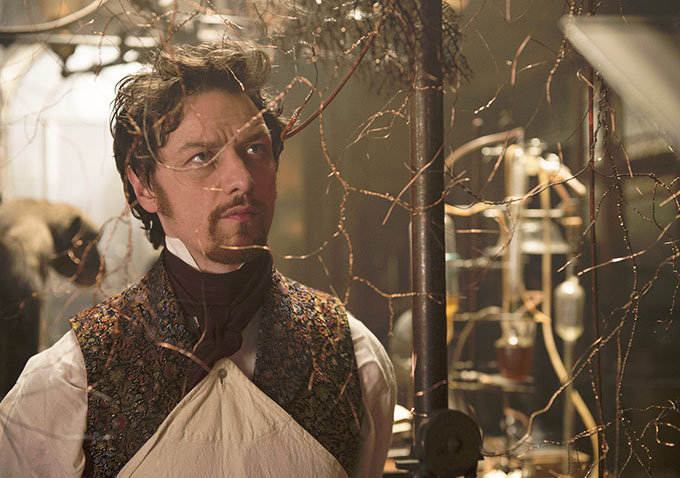 Modern reboots don’t get more monstrous than “Victor Frankenstein,” a wretched creation constructed in the image of various other distorted Hollywood do-overs. Playing by a pitiful contemporary revisionism playbook, Paul McGuigan’s film adds numerous elements to its classic tale that are neither necessary nor desired, be it assuming a supposedly novel perspective on Mary Shelley’s 1818-penned tale, concocting a superfluous new romantic subplot, or adding some Psychology 101 backstory motivation for its main character’s behavior. Worse still, it does away with the very empathy for its iconic behemoth that made its source material such a unique work of genre art, and replaces it with the sort of cacophonous sound, fury, and CGI hideousness that have defined similar cinematic efforts, like Stephen Sommers’ vampiric debacle “Van Helsing” and Joe Wright’s recent fairy tale fiasco “Pan.”
Modern reboots don’t get more monstrous than “Victor Frankenstein,” a wretched creation constructed in the image of various other distorted Hollywood do-overs. Playing by a pitiful contemporary revisionism playbook, Paul McGuigan’s film adds numerous elements to its classic tale that are neither necessary nor desired, be it assuming a supposedly novel perspective on Mary Shelley’s 1818-penned tale, concocting a superfluous new romantic subplot, or adding some Psychology 101 backstory motivation for its main character’s behavior. Worse still, it does away with the very empathy for its iconic behemoth that made its source material such a unique work of genre art, and replaces it with the sort of cacophonous sound, fury, and CGI hideousness that have defined similar cinematic efforts, like Stephen Sommers’ vampiric debacle “Van Helsing” and Joe Wright’s recent fairy tale fiasco “Pan.”
As with those kindred flops, McGuigan’s film envisions its protagonist in distinctly 21st-century terms, which in this case means that Victor Frankenstein (James McAvoy) is a cocky genius who strives to defeat death through the miracle of science because of typical childhood-rooted insecurities and anxieties. He’s got a father (Charles Dance) who loathes him for his recklessness and failure to maintain enrollment at college. Moreover, he’s plagued by a distressing past tragedy for which he feels responsible, and which compels him forward in his quest to prove that God doesn’t exist, much less holds dominion over the fate of man. Spewing spittle with every overly passionate bit of oration, and going wild-eyed and crazy-smirky whenever he achieves a new breakthrough, Victor is an arrogant, petulant rebel, and McAvoy embodies him with a hyper-haughty gusto that makes him seem like a direct ancestor of Mark Zuckerberg from "The Social Network."

Despite its title, however, “Victor Frankenstein” places its early focus not on the doctor but on his assistant Igor (Daniel Radcliffe), first introduced as a nameless hunchback circus clown who also just so happens to be a self-taught expert on human biology. This allows him to save his beloved acrobat Lorelei (Jessica Brown Findlay) when she takes a nasty fall and, in the process, to prove to Victor, who’s in attendance, to take him under his wing. Before you know it, Victor has dubbed his sidekick Igor, fixed his horrible posture (it was just caused by a giant, drainable cyst!), and giving him a respectable new appearance. Radcliffe’s early, string-haired circus-freak version of Igor recalls arched-weirdo Wybie from “Coraline,” but alas, McGuigan’s film has none of the style of that 2009 animated 3D gem, instead merely proffering a series of old-London vistas that are solely notable for their sub-“Moulin Rouge” ugliness.
Though there’s much blather about the unholy depravity of Victor’s quest – most notably from a pious Scotland Yard detective (Andrew Scott) whose main function is to amplify the material’s drama by routinely trying to arrest Victor – “Victor Frankenstein” cares little for questions of morality. Rather, its primary concern is indulging in gross-out gooiness and staging chase sequences marked by hectic blurriness, characters leaping and ducking in slow-motion, and a barrage of fiery electric sparks. There’s also a spastic sequence that finds Victor and Igor facing off against their initial stab at a resuscitated life form: a ferocious, stitched-together chimpanzee that, unsurprisingly, wants to escape his intolerable human masters.

Scored by Craig Armstrong with the same bombastic gracelessness that typifies the rest of its aesthetics, McGuigan’s film piles on the trailer-ready one-liners and zooms into close-up while progressing toward the inevitable birth of its creature. Unlike the monster imagined by Shelley (or inhabited on-screen, in 1931, by Boris Karloff), this creation is merely a hulking brute whose soullessness predictably confirms the error of Victor’s ways. By that point, however, “Victor Frankenstein” has fallen to pieces, ditching any pretense toward making this Igor’s take on the story – during the chaotic finale, the assistant is rendered a mere passive on-looker – and compelling its over-acting leads to amplify their histrionics to cartoonish levels. And as for horror? Aside from a few woeful jump scares, the film is too consumed with showcasing dreary digital effects, and photographing its players amidst gears and gadgets and funhouse-mirror glass, to bother crafting suspense. Deformed from the start, it confirms the very thing argued by its narrative – namely, the folly of unwarranted resurrections. [D]

